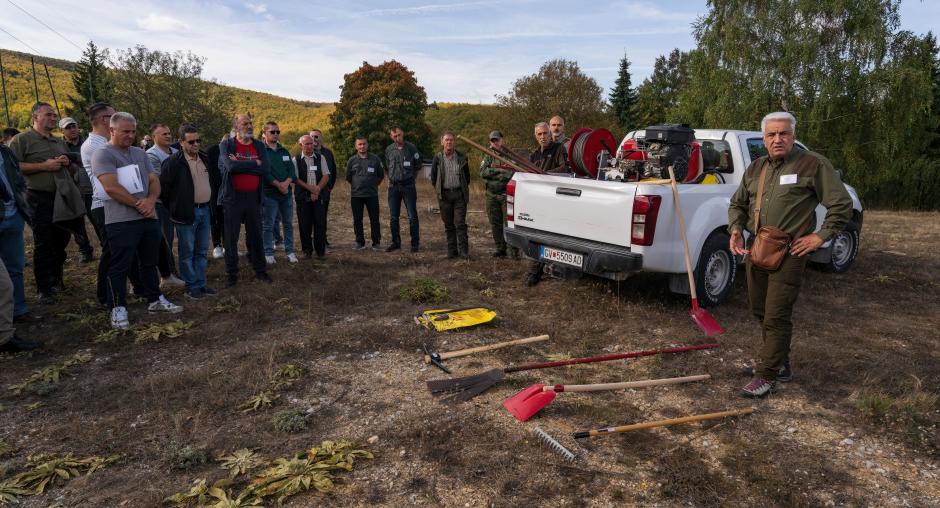OSCE enhances capacities for wildfire risk reduction and early warning to reduce climate vulnerabilities and strengthen resilience

Marking International Day for Disaster Reduction, the OSCE underlines the vital role of wildfire risk reduction, landscape fire management, and fire early warning in responding to the growing challenges posed by climate change.
On 9 and 10 October 2023, the OSCE partnered with the Global Fire Monitoring Center (GFMC) and Regional Fire Monitoring Center for South-Eastern Europe and South Caucasus (RFMC) to train over 40 participants representing the park management authorities and the civil emergency response units of the municipalities in the four protected areas of Korab-Koritnik, Mavrovo, Shar Mountain and Sharri/Šara on fire preparedness and response. The “Training on Wildfire Risk Reduction and Landscape Fire Management in the Shar/Šara Mountains and Korab Massif Area” included also a field exercise on forest fire suppression in Mavrovo, North Macedonia.
This was followed by the OSCE’s “Training on Fire Early Warning in the Shar/Šara Mountains and Korab Massif Area” on 12 October in Skopje, organized in collaboration with GFMC, RFMC, and the Crisis Management Center of North Macedonia. The representatives of the four protected areas were trained on early warning systems for wildfire risk assessment and risk-informed decision-making.
Both trainings aimed to strengthen local capacities and foster co-operation in tackling wildfire risks in the shared hotspot of the Shar/Šara Mountains and Korab Massif area, a biodiversity hotspot with outstanding natural value in South-Eastern Europe. They marked the launching of the pilot initiative “Fire Resilient Protected Areas: Shar/Šara Mountains and Korab Massif Area” within the framework of the joint co-operation strategy on climate change and security and its implementation plan that was developed by the OSCE in partnership with adelphi and GFMC through a consultation process that brought together all local stakeholders.
“The Shar/Šara Mountains and Korab Massif Area is highly vulnerable to fires due to the accelerated pace of climate change,” said Nikola Nikolov, Head of the RFMC. “Establishing efficient means for early warning, communication and exchange of information and experiences between local practitioners is key to preventing and effectively responding to fires in this shared nature reserve. These trainings are the first steps in this direction,” he added.
“Disaster risk reduction and tackling climate-related risks are an integral part of OSCE’s comprehensive approach to security,” said Esra Buttanri, Senior Climate Change Adviser at the Office of the Co-ordinator of OSCE Economic and Environmental Activities (OCEEA). “Through our extrabudgetary project on climate change and security, we are facilitating regional co-operation to prevent, prepare for, and jointly respond to wildfires aggravated by climate change. In this work, we are guided by the OSCE Ministerial Council Decision on climate change adopted in Stockholm in 2021 and the OSCE Ministerial Council Decision on disaster risk reduction adopted in Basel in 2014. The results of this work were prominent during the discussions at the OSCE High-Level Conference on Climate Change that was hosted by the OSCE Secretary General this year on 7 July in Vienna.”
Johann Georg Goldammer, Director of the GFMC, said: “The large wildfires that we are witnessing across the globe and in the OSCE area are a result of higher temperatures, increasing occurrence and severity of droughts, and increased arid conditions due to climate change. These fires, in turn, contribute to the destruction of carbon sinks and net release of large amounts of CO2 into the atmosphere, thereby exacerbating global warming. Tackling these complex challenges and enhancing the resilience of our natural and cultural landscapes to climate extremes and wildfires require co-operation at all levels. Our longstanding partnership with the OSCE to promote regional co-operation in this field contributes to broader international efforts for the implementation of the Sendai Framework for Disaster Risk Reduction”
The OSCE has been promoting regional co-operation to tackle climate-related risks through fire management also in the South Caucasus through two bilateral processes between Armenia and Georgia and Azerbaijan and Georgia. Most recently, the OSCE, in partnership with adelphi and GFMC, published a Scoping Study that analyses the current context of wildfire risk reduction, landscape fire management, and transboundary co-operation in Northern Armenia and Southern Georgia. The Scoping Study for bilateral co-operation in North-West Azerbaijan and North-East Georgia is in progress. The OSCE and GFMC are also partnering to strengthen climate resilience in Central Asia and Mongolia through promoting co-operation on fire management.
These activities are being conducted within the framework of the OSCE extra-budgetary project “Strengthening responses to security risks from climate change in South-Eastern Europe, Eastern Europe, the South Caucasus, and Central Asia”, which is implemented by OCEEA in partnership with adelphi and funded by Andorra, Austria, Czech Republic, Finland, France, Germany, Italy, Japan, Liechtenstein, Luxembourg, Norway, Poland, Sweden, Switzerland and the United States.
